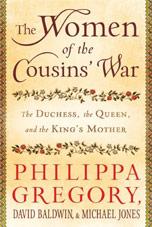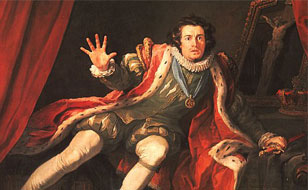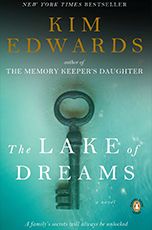 Last Fall, fans of British history and historical fiction were twice blessed with new books from bestselling historical novelist Philippa Gregory. Esteemed historians David Baldwin and Michael Jones joined the author in writing The Women of the Cousins’ War (Touchstone, 352pgs), a book of factual essays on three influential female figures during the events of England’s Wars of the Roses (1455–1485). Baldwin writes of Elizabeth Woodville, wife of Edward IV, who was noted as being the first commoner in England to marry a king for love. Jones, outlines the life of Margaret Beaufort, mother of Henry VII, and one of the lesser known women of the Tudor dynasty. Gregory presents the early life of Jacquetta, duchess of Bedford, who at one time stood trial for witchcraft. Along with this non-fiction account, Gregory also published The Lady of the Rivers (Touchstone, 464pgs), a fictional telling of Jacquetta’s life. Read more…
Last Fall, fans of British history and historical fiction were twice blessed with new books from bestselling historical novelist Philippa Gregory. Esteemed historians David Baldwin and Michael Jones joined the author in writing The Women of the Cousins’ War (Touchstone, 352pgs), a book of factual essays on three influential female figures during the events of England’s Wars of the Roses (1455–1485). Baldwin writes of Elizabeth Woodville, wife of Edward IV, who was noted as being the first commoner in England to marry a king for love. Jones, outlines the life of Margaret Beaufort, mother of Henry VII, and one of the lesser known women of the Tudor dynasty. Gregory presents the early life of Jacquetta, duchess of Bedford, who at one time stood trial for witchcraft. Along with this non-fiction account, Gregory also published The Lady of the Rivers (Touchstone, 464pgs), a fictional telling of Jacquetta’s life. Read more…

Categories: Biography, Fiction, Historical Fiction, News, Non-Fiction Tags: Britain, British monarchy, David Baldwin, duchess of Bedford, history, Jacquetta, Michael Jones, Philippa Gregory, Wars of the Roses

David Garrick as Richard III (detail) by William Hogarth
Did history and literature give Richard III a bad rap? Shakespeare immortalized the English king as a Machiavellian tyrant, and history has branded him as a hunched-backed villain, rumored to have murdered two princes in order to secure his ascension to the thrown. But according to author Philippa Gregory, Richard III may have just been misunderstood. In a recent interview with the LA Times, she discusses her new historical novel The White Queen (Touchstone, 432pgs), and her surprising take on this controversial figure. “It’s an act of historical recovery,” she says, “…history, of course, gets told by the victors. That’s what Shakespeare tapped into in his play about Richard — that and a medieval belief that a malformed mind led to a malformed body.” Gregory argues that there is historical evidence that supports a case for Richard’s innocence and for the guilt of the Tudor family, who eventually took Richard’s life and his thrown during the Battle of Bosworth Field in 1485.
Read more…

 Last Fall, fans of British history and historical fiction were twice blessed with new books from bestselling historical novelist Philippa Gregory. Esteemed historians David Baldwin and Michael Jones joined the author in writing The Women of the Cousins’ War (Touchstone, 352pgs), a book of factual essays on three influential female figures during the events of England’s Wars of the Roses (1455–1485). Baldwin writes of Elizabeth Woodville, wife of Edward IV, who was noted as being the first commoner in England to marry a king for love. Jones, outlines the life of Margaret Beaufort, mother of Henry VII, and one of the lesser known women of the Tudor dynasty. Gregory presents the early life of Jacquetta, duchess of Bedford, who at one time stood trial for witchcraft. Along with this non-fiction account, Gregory also published The Lady of the Rivers (Touchstone, 464pgs), a fictional telling of Jacquetta’s life. Read more…
Last Fall, fans of British history and historical fiction were twice blessed with new books from bestselling historical novelist Philippa Gregory. Esteemed historians David Baldwin and Michael Jones joined the author in writing The Women of the Cousins’ War (Touchstone, 352pgs), a book of factual essays on three influential female figures during the events of England’s Wars of the Roses (1455–1485). Baldwin writes of Elizabeth Woodville, wife of Edward IV, who was noted as being the first commoner in England to marry a king for love. Jones, outlines the life of Margaret Beaufort, mother of Henry VII, and one of the lesser known women of the Tudor dynasty. Gregory presents the early life of Jacquetta, duchess of Bedford, who at one time stood trial for witchcraft. Along with this non-fiction account, Gregory also published The Lady of the Rivers (Touchstone, 464pgs), a fictional telling of Jacquetta’s life. Read more…

